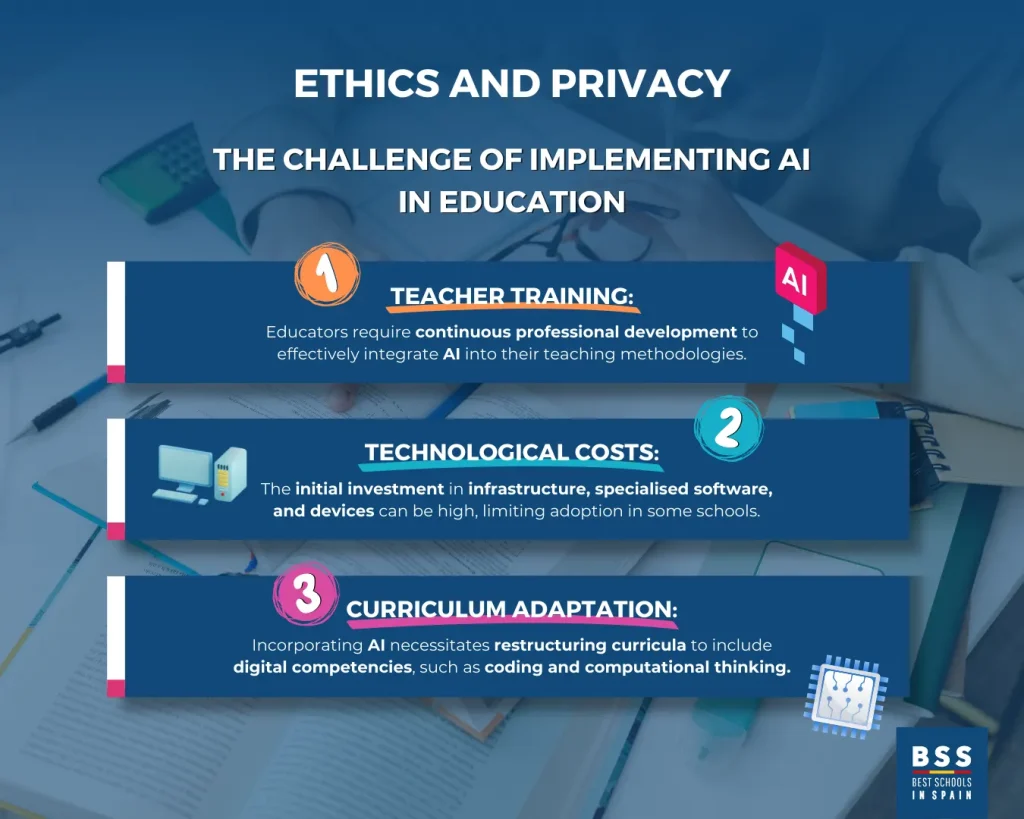Artificial intelligence AI in education is transforming the educational landscape, providing innovative tools to personalise learning, optimise processes, and enhance academic outcomes. However, its implementation raises significant ethical challenges, particularly regarding data privacy and the responsible use of technology.
This article explores how private schools in Spain are addressing these challenges to maintain a balance between innovation and educational values.
Ethics in AI in education: A Key Challenge
The introduction of AI in classrooms raises important ethical questions. Key concerns include:
- Equity in access to technology: Is AI available to all students equally, or does it widen the digital divide?
- Impact on human interaction: Could excessive technology use reduce teacher-student engagement?
- Accountability for AI decisions: Who is responsible if an AI system generates biased or incorrect outcomes?
Additionally, AI systems may perpetuate biases if not carefully designed. For instance, algorithms trained on historical data might favour certain groups, exacerbating existing inequalities. The challenge lies in designing AI systems that uphold equity, inclusion, and responsibility.
A hypothetical scenario would be an AI system prioritising high-performing students for additional tutoring, unintentionally excluding those who require more support. Preventing such biases requires the development of inclusive and ethically responsible AI models.

Data Privacy: A Pillar of Digital Responsibility
Student data privacy is one of the most pressing concerns when implementing AI in schools. AI-powered educational platforms collect vast amounts of information to personalise learning, leading to key questions such as:
- Who has access to this data?
- How is student data stored and protected?
- Are privacy laws, such as the GDPR in Europe, being followed?
Private schools have implemented key measures to safeguard student privacy:
- Strict data protection policies: Using encrypted systems to store sensitive information.
- Working with AI providers that meet international security standards: Platforms like Microsoft Education and Google for Education integrate advanced data protection.
- Providing cybersecurity training for students and families: Many private schools now offer cybersecurity workshops to educate students on safe and responsible technology use.
A practical example is the use of informed consent systems, where parents are notified and authorise the use of their child’s data for educational purposes, ensuring that information is not exploited for commercial gain.
Technological Challenges in Classrooms
Although AI offers numerous advantages, its implementation in classrooms presents technical and pedagogical challenges, including:
- Teacher training: Educators require continuous professional development to effectively integrate AI into their teaching methods. Platforms like Coursera and partnerships with edtech experts provide valuable training opportunities.
- High technological costs: The initial investment in infrastructure, devices, and specialised software can be a barrier to widespread adoption.
- Curriculum adaptation: Integrating AI into education requires revising curricula to include digital skills, such as coding, while also addressing the ethical implications of technology.
An example of effective AI integration is seen in pilot programmes where private schools train teachers to use AI-powered tools, such as ChatGPT and Khanmigo, to personalise learning experiences.
How Private Schools Are Addressing These Challenges
Private schools in Spain, particularly those within Best Schools in Spain (BSS), are taking a proactive role in ensuring the ethical implementation of AI. Key strategies include:
✔ Developing clear ethical policies: Establishing guidelines for AI use that prioritise equity and privacy.
✔ Promoting digital responsibility: Educating students on how to use AI safely and ethically.
✔ Collaborating with experts: Partnering with technology specialists to design AI systems that align with educational values.
Furthermore, these schools combine technological advancements with traditional teaching methodologies, ensuring a balance between innovation and human-centred education. This not only benefits students but also reassures families that AI is being implemented responsibly.
Balancing Innovation and Educational Values
The integration of artificial intelligence in education presents ethical and privacy challenges that must not be overlooked. Through clear policies, proper training, and a values-driven approach, private schools are demonstrating how to leverage AI’s potential while protecting student rights and well-being.
If you are looking for an education that combines innovation with responsibility, explore how Best Schools in Spain are leading the ethical integration of AI in education.
Visit our website to learn more about how these schools are shaping the future of education.



